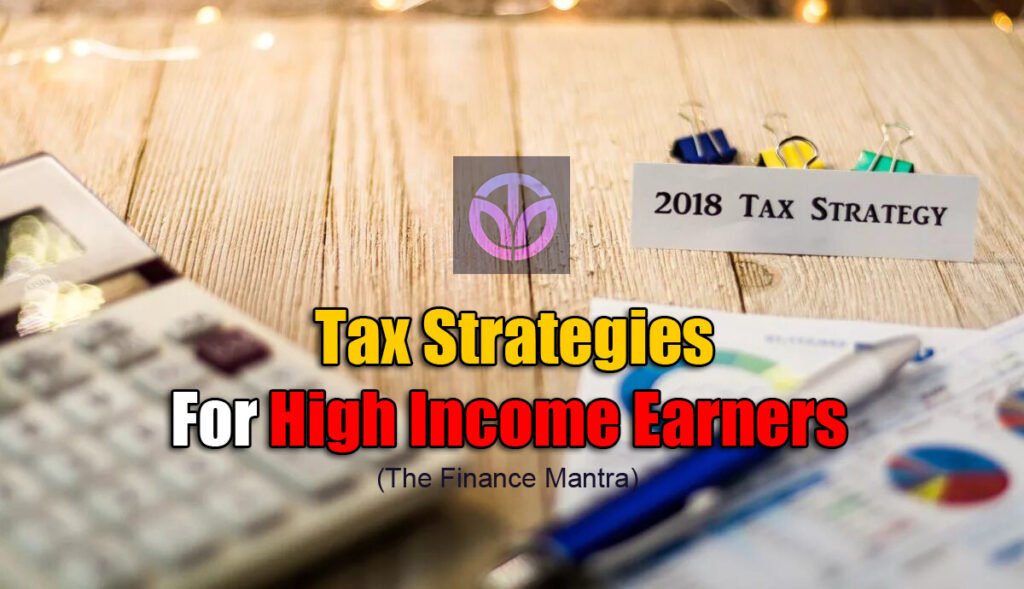Tax Strategies for High Income Earners: High-income earners face unique challenges when it comes to managing their tax liabilities. With higher income levels, the stakes are higher, and the need for effective tax strategies becomes crucial. By implementing Smart tax planning techniques, high-income earners can significantly reduce their tax burden and maximize their savings. In this article, we’ll explore several high-impact tax strategies that can help high-income individuals keep more of their hard-earned money.
1. Maximize Retirement Contributions
One of the most effective ways to reduce taxable income is by maximizing contributions to retirement accounts. High-income earners should take full advantage of the following options(Tax Strategies):
- 401(k) Plans: Contributing the maximum allowable amount to a 401(k) plan can significantly reduce taxable income. For 2024, the contribution limit is $19,500, with an additional $6,500 catch-up contribution for those aged 50 and older.
- IRA Contributions: Contributing to a traditional IRA can also provide tax benefits. For 2024, the contribution limit is $6,000, with a $1,000 catch-up contribution for individuals aged 50 and above.
- Roth IRAs: While contributions to Roth IRAs are not tax-deductible, the earnings grow tax-free, and qualified withdrawals are tax-free, providing long-term tax benefits.
2. Utilize Health Savings Accounts (HSAs)
Health Savings Accounts (HSAs) offer a triple tax advantage: contributions are tax-deductible, earnings grow tax-free, and withdrawals for qualified medical expenses are tax-free. High-income earners with high-deductible health plans (HDHPs) should consider maximizing their HSA contributions. For 2024, the contribution limits are $3,650 for individuals and $7,300 for families, with an additional $1,000 catch-up contribution for those aged 55 and older.
3. Take Advantage of Tax-Loss Harvesting
Tax-loss harvesting involves selling investments that have lost value to offset gains from other investments. This Tax Strategies can help high-income earners reduce their taxable income and manage capital gains taxes. The IRS allows individuals to offset up to $3,000 of ordinary income per year with capital losses, and any remaining losses can be carried forward to future tax years.
4. Invest in Municipal Bonds
Municipal bonds are an attractive investment for high-income earners because the interest income is generally exempt from federal taxes and, in some cases, state and local taxes. Investing in municipal bonds can provide a steady stream of tax-free income, which can be particularly beneficial for those in higher tax brackets.
5. Charitable Donations
Charitable donations are not only a way to give back to the community but also an effective tax strategy. High-income earners can deduct charitable contributions up to 60% of their adjusted gross income (AGI) for cash donations and up to 30% for appreciated assets. Donating appreciated assets, such as stocks or real estate, can also help avoid capital gains taxes.

6. Consider a Donor-Advised Fund (DAF)
A Donor-Advised Fund (DAF) allows individuals to make a charitable contribution, receive an immediate tax deduction, and then recommend grants from the fund over time. This strategy can be particularly beneficial for high-income earners looking to maximize their charitable deductions in a high-income year while spreading out their donations over several years.
7. Income Shifting and Splitting
Income shifting and splitting involve transferring income to family members in lower tax brackets to reduce the overall tax burden. For example, high-income earners can gift appreciated assets to their children or set up a family limited partnership (FLP) to shift income. However, it’s essential to follow IRS rules and guidelines to avoid any potential tax pitfalls.
8. Maximize Business Deductions
High-income earners who own businesses should take full advantage of available business deductions. This includes deducting expenses related to the operation of the business, such as office supplies, travel, and meals. Additionally, the Qualified Business Income (QBI) deduction allows eligible business owners to deduct up to 20% of their qualified business income.
9. Utilize Tax-Deferred Accounts
In addition to retirement accounts, high-income earners can benefit from other tax-deferred accounts, such as deferred compensation plans. These plans allow individuals to defer a portion of their income to future years when they may be in a lower tax bracket, reducing current taxable income.
10. Stay Informed About Tax Law Changes
Tax laws are constantly changing, and staying informed about new regulations and opportunities is crucial for high-income earners. Working with a knowledgeable tax advisor can help individuals navigate the complexities of the tax code and implement strategies that align with their financial goals.
Conclusion
Tax Strategies: Implementing effective tax strategies is essential for high-income earners to minimize their tax liabilities and maximize their savings. By taking advantage of retirement contributions, HSAs, tax-loss harvesting, municipal bonds, charitable donations, and other tax-saving techniques, individuals can significantly reduce their tax burden. Staying informed and working with a tax professional can help high-income earners navigate the complexities of the tax code and achieve their financial goals.
FAQs: Tax Strategies for High-Income Earners
1. What are some effective tax strategies for high-income earners?
- High-income earners can benefit from maximizing retirement contributions, utilizing Health Savings Accounts (HSAs), engaging in tax-loss harvesting, investing in municipal bonds, making charitable donations, and taking advantage of income shifting and business deductions.
2. How can maximizing retirement contributions reduce my tax liability?
- Contributions to retirement accounts like 401(k)s and IRAs are often tax-deductible, which reduces your taxable income. The earnings on these contributions also grow tax-deferred, further enhancing long-term tax savings.
3. What is tax-loss harvesting and how does it work?
- Tax-loss harvesting involves selling investments at a loss to offset gains from other investments. This strategy helps to reduce taxable income and manage capital gains taxes. You can offset up to $3,000 of ordinary income per year with capital losses, and carry forward any additional losses.
4. Are municipal bonds a good investment for high-income earners?
- Yes, municipal bonds are often a good investment for high-income earners because the interest income is usually exempt from federal taxes, and sometimes state and local taxes. This can provide a steady stream of tax-free income.
5. How can charitable donations help reduce my tax burden?
- Charitable donations can be deducted from your taxable income, up to 60% of your adjusted gross income (AGI) for cash donations and up to 30% for appreciated assets. Donating appreciated assets can also help avoid capital gains taxes.
6. What is a Donor-Advised Fund (DAF) and how can it benefit me?
- A Donor-Advised Fund (DAF) allows you to make a charitable contribution, receive an immediate tax deduction, and recommend grants from the fund over time. This strategy can maximize charitable deductions in high-income years while allowing for donations to be spread over several years.
7. Can income shifting help reduce my overall tax burden?
- Yes, income shifting involves transferring income to family members in lower tax brackets. For example, you can gift appreciated assets to your children or set up a family limited partnership (FLP) to shift income. It’s important to follow IRS guidelines to avoid potential tax issues.
8. What are some common business deductions for high-income earners?
- High-income earners who own businesses can deduct expenses related to the operation of the business, such as office supplies, travel, and meals. Additionally, the Qualified Business Income (QBI) deduction allows eligible business owners to deduct up to 20% of their qualified business income.
9. How can tax-deferred accounts benefit high-income earners?
- Tax-deferred accounts, such as deferred compensation plans, allow you to defer a portion of your income to future years when you may be in a lower tax bracket. This reduces your current taxable income and can provide significant tax savings over time.
10. Why is it important to stay informed about tax law changes?
- Tax laws are constantly changing, and staying informed about new regulations and opportunities is crucial for optimizing tax strategies. Working with a knowledgeable tax advisor can help you navigate the complexities of the tax code and implement effective tax-saving techniques.


